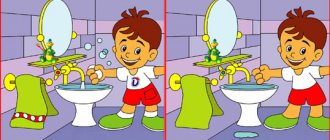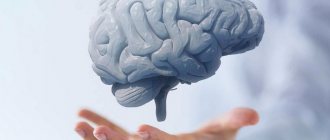© Author: Z. Nelly Vladimirovna, doctor of the first qualification category, especially for SosudInfo.ru (about the authors)
Memory is an important function of our central nervous system to perceive received information and store it in some invisible “cells” of the brain in reserve, in order to retrieve and use it in the future. Memory is one of the most important abilities of a person’s mental activity, therefore the slightest memory impairment weighs on him, he is knocked out of the usual rhythm of life, suffering himself and irritating those around him.
Memory impairment is most often perceived as one of the many clinical manifestations of some neuropsychic or neurological pathology, although in other cases forgetfulness, absent-mindedness and poor memory are the only signs of a disease, the development of which no one pays attention to, believing that a person is this way by nature .
What is senile sclerosis
For anyone, the ability to memorize information and remember something is necessary. Personal integrity, mental state and interaction with the outside world depend on this. Therefore, such disorders negatively affect mood and health.
More than 20% of all older adults over 70 years of age have trouble remembering new things, mastering skills, and retaining what they've learned.
Usually this disease is amnesia. It is she who deprives many of a full life and makes them doubt their capabilities. The disease can be of two types:
- partial;
- complete.
If a person has completely lost his memories, then even with the right therapy there is no guarantee that at least some of them will return. Along with this, frequent impairments and loss of some memory in old age are considered a common occurrence. In this case, everything disappears from the mind in fragments, pieces that the sick person himself, and sometimes his relatives, often do not notice.
In everyday life, a condition when a middle-aged man or woman cannot remember certain things or events familiar to him is called senile sclerosis. It is associated with changes in blood flow and narrowing of blood vessels in the brain. Sometimes this is directly related to a lack of blood circulation, when restored, the activity of the head returns.
Effective Tips to Improve Memory
To avoid unpleasant symptoms, it is important to monitor your health and take preventive measures. It is very important to control your weight, as obesity directly affects brain function and memory.
Therefore, it is recommended to create a balanced diet and use gentle methods of weight loss. Short-term amnesia can occur anywhere and at any time. To refresh your memory in a short period of time, you can try taking a few deep breaths. Such actions put thoughts in order, relax the body and enrich the brain with oxygen, as a result of which the necessary information is “found”. If there is a heavy workload during the day, it is recommended to draw up a rough action plan in writing, which will allow you to remember to pay payments or attend any events. In addition, such records are better stored in the head for a long time. For the same purpose, notes in notebooks help pupils and students remember the answer to the question posed. Mentally imagine the pages of the lecture, and the material will be easier to remember. Help for young parents: start developing memory from a young age in a playful way, so as not to have to deal with treatment in the future. As a result, the child will do what he loves and at the same time improve brain function. Useful activities include putting together puzzles, playing scrabble, finding objects in a room, selecting rhymes, making associative series, etc.
More information in the article about how to improve memory and attention in adults
Poor memory and failures in older people: manifestations and treatment
With age, all internal organs and systems gradually wear out and slow down. Metabolism and tissue regeneration slow down, cells lose their plasticity. Neural connections also become less strong, so the ability to remember information and apply new knowledge deteriorates.
At first, you can’t remember how to cope with new technology - use the phone and computer. Then the disease progresses and begins to affect old skills - one forgets how to use a meat grinder or other familiar item purchased 10 years ago. Basic skills disappear, including the ability to hold and use a pen for its intended purpose.
It is important to start taking medications for memory loss and multiple sclerosis on time for an elderly person. An integrated approach has a positive effect and prevents the progression of the disease. But you cannot prescribe medications to yourself or a loved one; this should be done by a doctor after an examination.
There are several reasons for the deterioration:
- skull and brain injuries;
- tumors;
- hypoxia due to heart problems;
- constantly high blood pressure;
- stroke accompanied by changes in blood circulation;
- infectious diseases;
- disruptions in the functioning of the nervous system;
- sedentary life;
- consequences of long-term chemical therapy;
- tobacco, alcohol and drugs;
- Alzheimer's disease;
- unstable metabolism and sleep.
These are not the only reasons that lead to memory impairment and loss in old age. This can be caused by diabetes mellitus, paranoid schizophrenia, and even just poor nutrition.
A pensioner should not be allowed to feel unnecessary, remain alone for a long time, or constantly experience stress. If he withdraws into himself and gets overexcited, living alone, problems will not be long in coming.
But it’s worth mentioning separately about the situation when he performs some moments automatically. If these are regular repeating algorithms - woke up, made the bed, brushed his teeth - then he may not remember them.
Leave a request for selection of a boarding house
for an elderly person with memory loss
Why memory is lost in older people - reasons
It mostly starts after 50 years of age and peaks at 65-70 years of age. Age-related changes make it difficult to remember dates, your own actions, and conversations. But we cannot assume that this is a normal process. If a pensioner has any symptoms, he needs to seek help.
The ability to remember deteriorates mainly due to:
- sudden hemorrhages, sometimes microscopic;
- vessels that lose elasticity;
- serious disorders in the head.
This may be due to hormonal changes or an infectious disease, a very slow metabolism and frequent stress.
It is important to understand that there are medications available to restore memory and improve brain function in older adults. If rehabilitation is started in a timely manner, the development of disorders can be minimized.
The first symptoms for which treatment should be started
The most risky thing is when a man or woman goes to the store to buy bread and is unable to get home. This can happen at any age for various reasons. A person who has forgotten his address begins to get nervous and aggravates the problem - he cannot figure out where he is, what his name is, how old he is.
Short-term episodes when a person forgets for several hours what happened yesterday. This is not so dangerous, but it still requires taking medications that improve memory in the elderly.
Some of the first serious symptoms include:
- changes in handwriting;
- disturbances in speech and phrase construction;
- increased blood pressure, moral tension while performing familiar and simple actions;
- constant forgetfulness, especially regarding promises;
- attention to communication, music, films, information is lost;
- interests become much smaller;
- a sick person quickly gets tired and irritated, tenses up for no apparent reason and becomes angry.
If one or more situations are repeated in life over the past 5 months, then you need to think about treatment. You should contact a specialist who knows what special medications, drugs and other means to improve the memory of older people should be used. See also: Symptoms of a heart attack: how the first signs of the disease appear
Reasons for deterioration
There are many reasons for memory deterioration, but they are all divided into age-related changes, those reasons that are associated with brain damage, those that arise due to various diseases of other organs, the consequences of intoxication processes and those that arise due to external negative factors.
Causes associated with direct damage to the brain itself as a human organ include traumatic brain injury, acute circulatory disorders or stroke, and various oncological problems in this organ. External factors that adversely affect memory include insufficient sleep, various stresses, changes in living conditions, and increased brain load. Chronic intoxication processes that cause forgetfulness should be understood as conditions that are provoked in the human body by alcoholism, smoking, drug addiction, abuse of tranquilizers and other pharmacological drugs.
Human memory is directly dependent on various modalities. The modality can be visual, auditory, motor. Modalities can also be combined in different proportions with each other. This determines how it is easier for a particular person to remember information. Some people prefer to learn something by saying information out loud, others find it easier to remember what they read, others must see a page with text or graphics that contains the material. Different parts of the human brain are responsible for different memory-related functions. The sections in the temple area are responsible for the auditory perception of speech or sounds, the occipital-parietal zone is responsible for spatial and visual perception. In the left hemisphere, visual perception is focused on letters and objects, and in the right hemisphere, on optical-spatial, color and facial perceptions. The inferior parietal zone is responsible for the functionality of the hands and the speech apparatus, which, when damaged, leads to astereognosia, that is, the inability to identify an object by touch. Thus, we can conclude that it is precisely the type of memory that is disrupted that is characteristic of a certain affected area of the human brain.
Modern research has a lot of evidence regarding the theory that hormonal levels greatly affect the thought process and memory. These processes can be positively influenced by hormones such as testosterone, vasopressin, estrogen, and prolactin. Hormones contribute to the transformation of short-term memory into long-term memory, but not all. For example, oxytocin, on the contrary, significantly weakens the process of remembering information, causing forgetfulness in women during breastfeeding and after childbirth.
Types of failures
Senile forgetfulness is not a condition that can be ignored. There are criteria by which the disease can be classified:
- by speed - sudden and gradual;
- in terms of coverage – selective and global;
- for events that are forgotten - retrograde (when new knowledge is not absorbed) and anterograde (when it is impossible to remember what was always known);
- by time - short-term and long-term;
- by prevalence - complete and partial.
The visual variety is taken into account separately, when an elderly person loses memory of faces and does not know what to do. He does not recognize relatives and friends, gets nervous and forgets faces. This aggravates the condition and plunges the patient into constant stress and tension. This can lead to nervous exhaustion and rapid development of the disease. Sometimes amnesia provokes depression, hatred of others and other negative processes.
Therefore, you often have to look for a boarding house in which a pensioner will feel comfortable. Comfortable houses of the “Zabota” boarding house network are at your service. There are medical staff and a suitable social circle.
What is the name of the disease memory loss in the elderly?
Sclerosis, short-term clouding of the mind - they can be determined by a doctor who needs to be observed after overcoming the 65-year mark. If you cannot visit regularly, you should contact us at the first unpleasant symptoms and at the very beginning of forgetfulness. At particular risk are those who live separately, when there are no relatives or they live very far away and rarely visit.
Psychological causes of problems
Memory problems do not always provoke physical illnesses. When a retiree becomes lonely, he loses important social skills and feels unwanted and useless. This destroys his personality. Every day the same procedures and actions are repeated, it becomes automatic and fades because these are insignificant events.
In addition, the following can provoke amnesia:
- emotional turmoil;
- negative news;
- constant stress;
- mental illnesses;
- depression;
- intellectual tension;
- depressed state.
Therefore, if an elderly spouse dies in a married couple, then medications that improve memory in older people, such as pills for sclerosis and other memory problems, cannot be avoided. Living alone after a long marriage almost always leads to a sharp deterioration in health. You can't leave a person alone. He should be taken into his home and family or placed in a boarding house, where he will be helped to feel like part of a team.
Parkinson's disease
Based on certain symptoms, you can determine whether young people have memory problems. The doctor will tell you the reasons for what to do in this case. Parkinson's disease predominantly affects older people, but recently there have been cases of 40-year-old patients diagnosed with this pathology. This chronic disease is accompanied by impaired memory and thinking functions, trembling of the limbs, stooping, reduced motor activity and paralysis.
Types of amnesia
There are several of them, but only a doctor can determine the specific variety:
- Regressive or short-term. Sometimes memories fade and reappear, but some may be gone forever.
- Progressive. Usually, recent events disappear first, then what happened before is gradually forgotten. It is impossible to assimilate new data. The most enduring fragments emerge from the past, usually from youth.
- Stationary. Most often, it is an irreversible process when pictures from the past are erased from life forever and are practically not restored.
- Fixation. With it, people become absolutely helpless - they are unable to remember anything that happens. They cannot answer whether the gas in the kitchen was turned off or the door was locked. It is dangerous for them to live on their own.
- Pseudo-reminiscence. A severe form, when instead of lost memories a person unconsciously invents new ones, distorts facts to fill in the gaps.
Sometimes there is nothing to worry about, but in other cases only a good doctor can help.
Other development courses
Speed reading in 30 days
Increase your reading speed by 2-3 times in 30 days. From 150-200 to 300-600 words per minute or from 400 to 800-1200 words per minute. The course uses traditional exercises for developing speed reading, techniques that speed up brain function, methods for progressively increasing reading speed, exercises for memorizing what has been read, the psychology of speed reading and the questions of course participants are discussed. Suitable for children and adults reading up to 5000 words per minute.
Sign up for a courseFree lesson
Verbal counting
Learn to quickly and correctly add, subtract, multiply, divide, square numbers, and even extract roots. I will teach you how to use easy techniques to simplify arithmetic operations. Each lesson contains new techniques, clear examples and useful tasks.
Sign up for a courseRead more
Brain fitness secrets
The brain, like the body, needs fitness. Physical exercise strengthens the body, mental exercise develops the brain. 30 days of useful exercises and educational games to develop memory, concentration, intelligence and speed reading will strengthen the brain, turning it into a supercomputer.
Sign up for a courseRead more
Characteristic symptoms
It is necessary to monitor the first signs:
- outbursts of aggression and irritability;
- deterioration of speech;
- concentration is low;
- feeling depressed and depressed;
- sharp and severe distortion of handwriting.
Acute partial short-term memory loss in older people: diagnosis, causes and treatment
This is quite common at this age. A sudden phenomenon can last from a couple of minutes to several days. An attack can occur once a year or daily. In the acute form, the patient sometimes does not realize what is happening to him.
This can be caused by:
- injuries;
- hypoxia;
- mental breakdowns;
- consequences of stroke;
- impaired blood circulation in the brain.
In addition, it is believed that an acute lack of B vitamins can provoke such changes. Smoking, alcohol and drugs aggravate mental health.
This usually goes away on its own, but if it recurs frequently or creates new problems, it is advisable to see a specialist.
Sudden loss of memory and thinking in older people
This is an incompletely studied phenomenon that makes a person’s life dangerous at any age. It can happen at any time, for no apparent reason. And now this happens even more often than a couple of decades ago. The sick person forgets everything - name, address, relatives, work. His information about what and how he lived is completely erased. Just by going out to the store, he may never return, because he will not remember who he is and where he lives.
Progressive amnesia
Usually occurs in those who have problems with the brain and nervous system. It also develops against the background of atherosclerosis, injuries and some other serious diseases. In this case, memories disappear slowly but inevitably.
Problems after a stroke
This is a circulatory disorder that directly affects the ability to remember and remember. A person who has suffered a hemorrhage begins to confuse events from childhood with current events, loses the sense of space and time, and does not understand who he is and where he is.
Only a doctor can prescribe treatment, based on individual characteristics and the level of brain damage. Self-medication will lead to tragic consequences.
Prevention. Exercises
There are different reasons why young people have memory problems. Prevention will help counteract the problem. In order to overcome this syndrome, you need to train your own memory, focus on details, keep a diary, write down events, calculations. American professor Katz has developed a technique that activates all parts of the brain. At the same time, attention, memory, and creativity develop. Here are just a few exercises:
- Try to do all your usual things with your eyes closed, rather than open.
- Let right-handers try to do household chores with their left hand, and left-handers, on the contrary, with their right. You will immediately feel the result.
- Learn Braille, master sign language.
- On the keyboard, try to type with all your fingers.
- Master some handicraft - embroidery, knitting.
- Learn foreign languages.
- Learn to distinguish coins by touch and determine their value.
- Read books about things that have never interested you before.
- Communicate more, visit new places: theaters, parks, meet new people.
By adhering to the recommendations listed, you will notice how after some time your thinking and memory will begin to change for the better. Small details and ongoing events will fit more clearly into your brain, and your memory will become more voluminous.
How to treat memory loss and deterioration in older people
Corrective methods depend on the underlying causes, diagnosis and progression of the disease. The most popular categories of drugs:
- anticholinesterase;
- nootropics;
- memantines.
Then they try to normalize the functioning of the cerebral cortex and restore memories. Each elderly person reacts to treatment individually, so the prescriptions will be only for him.
Usually prescribed:
- Donepezil;
- Undevit;
- Nootropil;
- Akatinol Memantine;
- Bilibol.
If the failure was sudden, then they give stimulant medications, which often help quite quickly.
Adjusting your diet and lifestyle
When the first memory problems appear, you need to see a doctor and take all the medications he prescribes. Stay calm and avoid stress.
Some tips for correction:
- sleep should remain complete, at least 7-9 hours;
- a person should rest more and walk if possible;
- it is important to be in a friendly atmosphere;
- listen to the elderly, talk to them, do not let them withdraw into themselves;
- Demand that your ward give up bad habits.
Nutritional Features
Eat often and regularly. The basis of the diet is cereal soups, dietary meat, and broths. It is better if the food is boiled, baked, baked. It is better to sit down at the table at the same time every day.
Useful to eat:
- fresh vegetables and fruits;
- dairy products;
- nuts;
- seafood;
- bitter chocolate.
Medicines
Therapy must be comprehensive. They almost always prescribe one or more from the list:
- Glycine;
- Nootropil;
- Piracetam;
- Omega-3;
- Folic acid;
- Cerebrolysin;
- Vitrum memory.
Diets
In this condition, it is important to eat a low-calorie diet. It is also important to take medications and boost brain function with sugar. You should not lean on fried and fatty foods; instead, it is better to add more fresh herbs - parsley and basil.
The main task of the attending physician is to enrich the body with oxygen as much as possible and normalize metabolism.
Folk remedies
There are recipes at home that will help improve your health. But it is not recommended to rely only on them. Therapy must be comprehensive.
Good decoctions:
- clover;
- rowan bark;
- pine buds.
Classes
One of the most effective methods to restore clarity and the ability to think to your mind is to train it. To do this, you can memorize poetry, play chess, learn other languages, and solve crossword puzzles.
Plus, there are few things quite like taking a walk in the park with a good book. But it is worth understanding that such exits from the premises must be with an accompanying person or in the fenced area of a specialized institution. A person who leaves home for a walk may not return.
Physical activity is also recommended:
- hiking;
- easy running;
- swimming;
- Biking.
Recommendations for parents
Parents are often at a loss if their baby shows signs of poor memory and cannot remember anything. But we must not give in to panic and know what to do in such situations, how to restore lost memory skills to a small family member, and how to prevent breakdowns in the future.
The brain, as one of the important organs, constantly needs training. More time should be devoted to training and consolidation of the material covered. Game moments are important; you should unobtrusively invite the child to play a game with the key question: “What did we learn (watch, read) yesterday (the day before yesterday, three days ago)?”
The child must calmly talk about events at school, about a conversation in a store; it is necessary to develop memory skills using such everyday examples. Memorizing poems, jokes, and sayings has a beneficial effect on the development of memory. It is recommended to go back several days on the material you have learned. To help your child memorize poems, it is recommended to learn the poem from color pictures. Logical memory enhances the memorization of the material covered.
If a child has a poor memory, and he does not look away from his tablet or smartphone and spends all his free time with “electronic friends,” parents are obliged to distract him in various ways, offer to go to the zoo, to an exhibition, to a museum. The baby must receive new information from the external environment.











